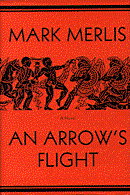
Gay/Lesbian/Feminist Bookstores Around the Country
The Mostly Unfabulous Homepage of Ethan Green
![]()


Meet the Author
Mark Merlis, the author of An Arrow's Flight, discusses his influences and intentions
What was your inspiration for An Arrow's Flight? How did it come to be written?
The book is based on the Philoctetes of Sophocles, an obscure tragedy that I first learned of from an Edmund Wilson essay, The Wound and the Bow. About ten years ago, a friend who was running a new playwrights' festival in Baltimore asked if I wanted to contribute a play. I was getting nowhere with an early draft of American Studies and said sure. It was around this time that I stumbled on Philoctetes. I began a modern-dress version of the play. I can't find the play (probably I backed up something on the floppy that once held it) but I do recall that it included a riveting scene in which the audience was asked to clap if it believed in Heracles. As the rest of the play was equally fine, I abandoned it. The story stuck with me, for reasons I cannot articulate -- I never feel that I choose my subjects, but rather that they choose me -- and I began the novel in 1994. The leap from play to novel was not a large one: I always begin my fiction with dialogue, and add such tiresome details as character and setting later on.
What other writers do you consider influences on your work in general and An Arrow's Flight in particular?
My style probably derives from some mix of John Cheever, early Didion, Faulkner, Auden, and, oddly, John O'Hara. I used to say that George Eliot was my favorite writer, thinking this made me serious; I still admire the rather dogged way she digs for some humanity in her villains. More recently I have been thinking that Philip Roth is the exemplary American novelist, at least for those of us who are lifelong aliens here and whose stories never include horses.
The method of An Arrow's Flight, with its play on ancient and modern, is somewhat indebted to Christopher Logue's reworkings of Homer, though there are earlier precursors, such as Robinson Jeffers's version of Medea. Really, we were all preceded by the unself-conscious anachronicity of the old painters, and of Shakespeare. But who, this side of Melville, would have the nerve to claim Shakespeare as an influence?
Do you consider yourself a gay writer? A writer who writes about gay topics? Is there any difference in your mind?
Funny you should ask. I've been thinking about this lately. I am, of course, a gay man whose first two published novels are swarming with gay characters. And I have allowed myself to be marketed as a practitioner of a genre called gay fiction. But this is a commercial category, not an artistic one. I write, like anybody else, about how it is to be human. I wonder if the category, "gay people," like that of gay fiction, isn't also a sort of marketing construct -- perhaps useful politically and in defining some community of interests, but not very helpful as a way of rooting yourself in the world.
In An Arrow's Flight, you write about urban gay life in the late 70's/early 80's, a background used by other well-known novels (Dancer From The Dance by Andrew Holleran and The Farewell Symphony by Edmund White, for example). How did the mythic background of your novel help or hinder?
This question implies that the mythic material is a device for exploring modern gay life, when in fact the reverse is more nearly true. The modern material is a way of easing the reader into the drama and of rephrasing, without fundamentally modifying, the questions Sophocles asked: what country are we really citizens of, and what do we owe to one another in that country?
An Arrow's Flight and your first novel, American Studies, seem as completely different as two from the same writer could be. What, if anything, are the similarities between the two?
This is clearly a question for somebody's midterm exam. I could point to some common motifs -- loyalty and betrayal, sex as an economic transaction, the transcendent yearnings that underlie the erotic. More fundamentally, both books are about breaking the chain of power and violence that permeates both straight and gay culture.
Who do you consider the audience for your work? Do you write with that audience in mind? How important is the "reader" to you when you are writing?
There are actually, I guess, three audiences. The narrator is addressing an audience of Greeks a generation younger than himself. I am intermittently aware, when writing, of the probable readership for the book; this determines, among other things, what I need to explain and what I can leave unsaid. Ultimately, though, I write for an ideal reader who gets all my jokes and allusions and does not tolerate the slightest lapse, grammatical or moral. This reader is, perhaps, a sort of internalized stand-in for the great fraternity that every writer wants to join. More grandly: my reader is the personified canon, the tradition to which I hope to append a page.
More from An Arrow's Flight :
- Introduction: The Trojan War, blending ancient headlines and modern myths.
- From Chapter 1: Meet Pyrrus, our hero, strutting his stuff in a Grecian strip club.
- From Chapter 2: Flashback to the life of young price Pyrrhus, dreaming of Troy.
- From Chapter 7: Pyrrhus discovers an unexpected guest in his bedroom.
- From Chapter 8: Pyrrhus' origins uncovered: fabulous and even divine.
Copyright © 1998
Mark Merlis.
 Back
to the Stonewall Inn
Back
to the Stonewall Inn
